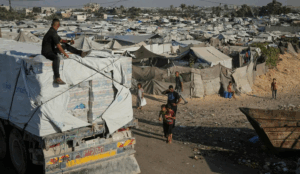‘Under the guise of bureaucracy’ Israel blocks humanitarian groups from delivering essential aid in Gaza

A truck carrying aid drives through Khan Younis, southern Gaza Strip on 2 November 2025
Nir Hasson reports in Haaretz on 4 November 2025:
Israel has implemented a new procedure requiring all humanitarian organizations operating in Gaza and the West Bank to reapply for official approval, with many denied, despite the relative calm in Gaza following the cease-fire.
Dozens of organizations that had previously been authorized have now been forced to halt their work due to the stringent new regulations, leaving thousands of tons of food and aid supplies stranded outside Gaza.
The humanitarian situation in the Strip remains dire: hundreds of thousands of residents continue to live in tents, while water, sewage, and electricity systems are destroyed, and hospitals are collapsing under the pressure of wounded and sick patients. Food prices remain high, and much of the population still depends on humanitarian aid to survive.
The new procedure was formulated in March, following the transfer of NGO registration from the Welfare Ministry to the Diaspora Affairs Ministry, headed by MK Amichai Chikli of the Likud party. It requires organizations to submit extensive documentation to Israel, including full lists of both Palestinian and foreign employees and details about their family members.
The Diaspora Affairs Ministry now holds broad discretion to deny applications. It may reject any organization deemed to “deny the existence of Israel as a Jewish and democratic state,” “promote delegitimization of Israel,” or support “efforts to prosecute Israeli citizens in foreign or international courts.” An organization may also be disqualified if any of its employees has, within the past seven years, publicly called for a boycott of Israel. Chikli has previously accused some humanitarian organizations of “undermining Israel’s existence under a humanitarian guise, promoting boycotts, and slandering the state.”
Organizations were required to submit their renewal applications by early September. and according to a Haaretz tally, 37 groups that work or seek to work in Gaza submitted requests. The Diaspora Affairs Ministry said it had rejected 14 out of 100 total applications, with the rest still under review, though it is unclear if those numbers include organizations operating in the West Bank and East Jerusalem.
Some of the approved groups have worked with the Gaza Humanitarian Foundation (GHF), a controversial body established by Israel and the U.S. to replace the UN and other major humanitarian actors in Gaza – a move that has drawn sharp criticism.
Currently, dozens of aid organizations operate in Gaza. Without registration, they are not permitted to bring food or other supplies into the Strip or any other area. Their employees also cannot obtain entry permits to Israel or the West Bank, where most of the coordination work takes place. Without approval, organizations cannot purchase or transport equipment through Israel.
Among the major international NGOs still awaiting a response are Oxfam, Save the Children, and the Norwegian Refugee Council (NRC). Many of them doubt they will pass the new registration process, having refused to provide Israel with full lists of their Palestinian and foreign staff – a step they say could violate privacy and data protection laws in their home countries.
In recent weeks, Israel has further tightened restrictions, blocking organizations from bringing food and supplies into Gaza via indirect channels. Until now, groups lacking direct approval could partner with UN agencies or other authorized NGOs to deliver aid. But Israel has recently banned this workaround. As a result, large quantities of supplies – including mattresses, tents, tarps, desalination equipment, sealing materials, clothing, winter gear, hygiene kits, and food – are now stuck in Israel, Jordan, Egypt, and the Palestinian Authority.
The NRC, which has worked in Gaza and the West Bank for 15 years, has been unable to deliver any supplies to Gaza for over seven months. It purchased $4 million worth of aid, but all of its requests to transport goods were denied. Aid groups now expect that some of the stock – such as honey, biscuits, hygiene kits, and desalination equipment purchased by Oxfam – will be redirected to other crisis zones to avoid spoilage.
Bushra Khalidi, Oxfam’s policy lead in the occupied territories, said the new procedure is part of a broader Israeli policy of “collective punishment that makes Gaza unlivable.” She described the policy as “a political process that obstructs humanitarian work and deepens suffering in Gaza.”
Attorneys Yotam Ben Hillel and Aluma Kolan, who represent several international NGOs, said, “Israel is blocking humanitarian aid under the guise of bureaucracy.” They added that the government has transferred responsibility for NGO registration to a ministry “lacking expertise and understanding of humanitarian work,” claiming it seeks “to justify its existence through persecution.”
In response, the Diaspora Affairs Ministry said, “Israel supports humanitarian activity – but will not allow hostile or terror-supporting entities to operate within its territory or the West Bank under humanitarian cover. Any organization that meets the clear criteria set out in the procedure will be approved and able to work freely. Conversely, any group or individual linked to terrorism, involved in campaigns against Israel or the IDF, or denying atrocities committed against the Jewish people will not be approved.”
This article is reproduced in its entirety
